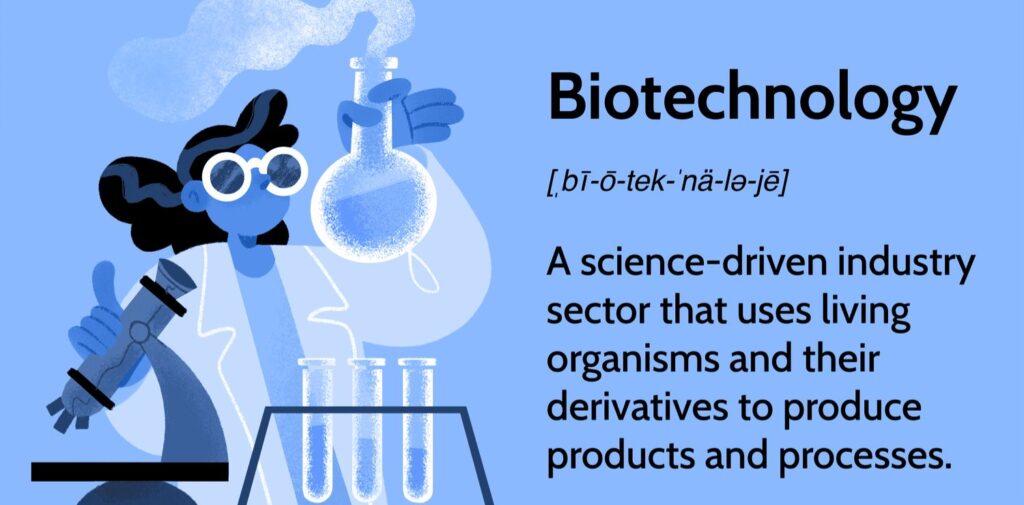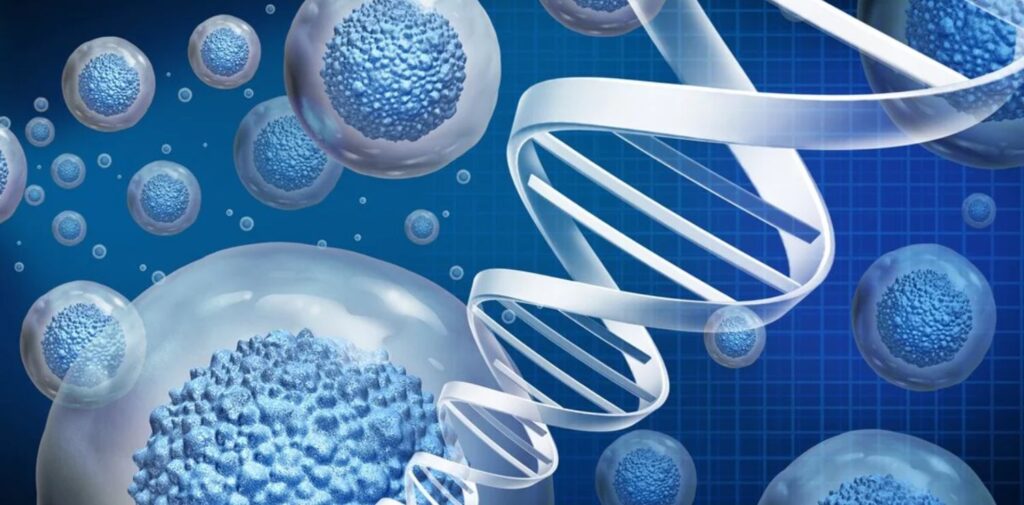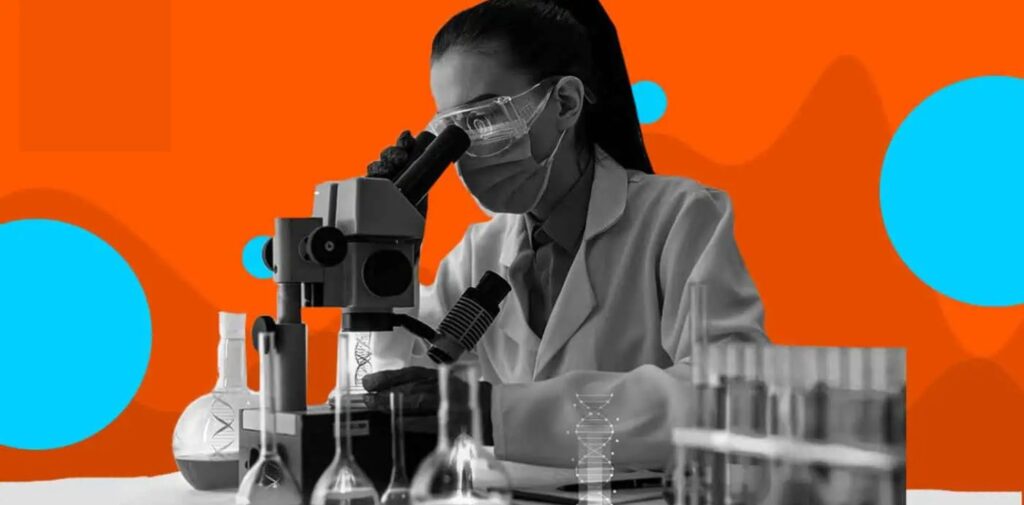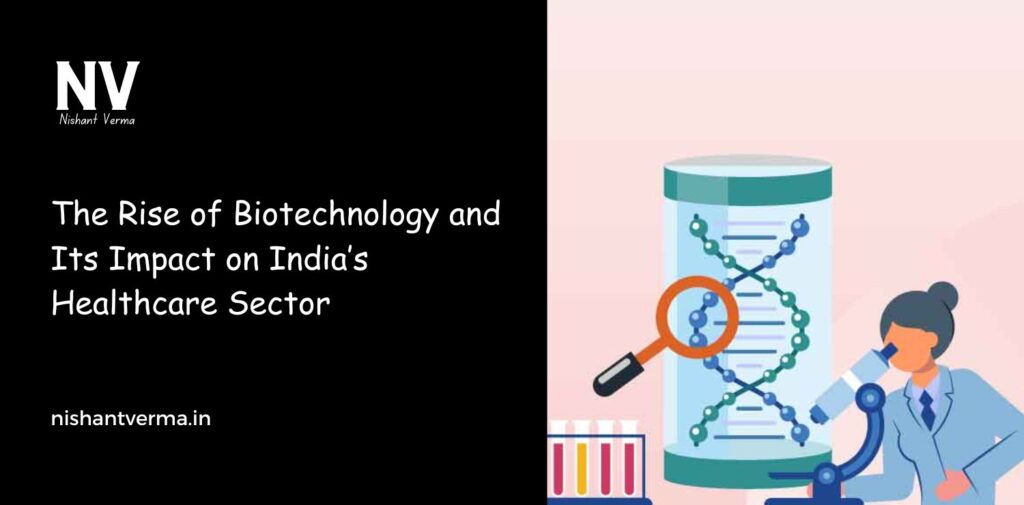Biotechnology is one of the most exciting fields of science today. It involves using living organisms, like bacteria or plants, or parts of them, like cells and genes, to make products or solve problems. In India, biotechnology has played a big role in shaping the healthcare sector, improving the way doctors treat diseases, and offering new ways to improve the health of millions of people. In this article, we’ll explore how biotechnology is changing the healthcare system in India and the positive effects it is having on the country’s health and economy.

What is Biotechnology?
Before we dive into how biotechnology impacts healthcare, let’s first understand what biotechnology is. In simple words, biotechnology is the use of biological systems or organisms to create products and solutions. This can be things like medicines, vaccines, or even crops that are resistant to disease. Scientists use biotechnology to make life-saving treatments, improve agricultural crops, and even clean up pollution.
In healthcare, biotechnology is used to create medicines and vaccines, improve the diagnosis of diseases, and develop treatments that can cure or manage serious illnesses. It is a field that combines biology, technology, and innovation to improve people’s health.
Biotechnology’s Growth in India
India has always had a rich history of scientific research and medical advancements. In the last few decades, biotechnology has become a fast-growing industry in the country. India’s biotechnology sector has been growing rapidly and has become one of the leading biotech industries in the world. The country has many biotechnology companies, universities, and research institutions that work on finding new ways to improve healthcare using biological science.
India’s government has also recognized the importance of biotechnology and has introduced policies to support and encourage the growth of this field. The government has invested in biotechnology research and development (R&D) and has created programs to help biotech companies thrive. These efforts have made India a major player in the global biotechnology field.
How Biotechnology is Changing India’s Healthcare
Biotechnology is making a huge impact on India’s healthcare system in many ways. It is helping doctors diagnose diseases better, create new treatments, and find cures for diseases that were once thought to be impossible to treat. Let’s look at some of the ways biotechnology is helping India’s healthcare sector:
Affordable Medicines and Vaccines
One of the biggest contributions of biotechnology to India’s healthcare system is the development of affordable medicines and vaccines. In India, many people live in poverty, and access to healthcare can be difficult. Biotechnology has helped make medicines more affordable by using advanced techniques to produce them in large quantities at a lower cost.
For example, India is known as the “pharmacy of the world” because it produces a large number of generic medicines. These are copies of brand-name drugs that are sold at much lower prices. Many of these medicines are made using biotechnology, which allows companies to make life-saving drugs like insulin and HIV/AIDS treatments at affordable prices. This helps people who cannot afford expensive treatments to still get the care they need.
Biotechnology has also played an important role in the development of vaccines. India has become a leader in producing vaccines for diseases like polio, hepatitis, and measles, and is one of the largest exporters of vaccines worldwide. Through biotechnology, scientists can create vaccines that help protect millions of people from deadly diseases.
Advanced Diagnostic Tools
Biotechnology has made diagnosing diseases easier and faster. Diagnostic tests help doctors find out what’s wrong with a patient and how to treat them. In the past, it took a long time to diagnose diseases, but with the help of biotechnology, doctors can now use genetic tests and biomarker tests to quickly and accurately diagnose diseases like cancer, heart disease, and diabetes.
One of the most important tools biotechnology has created is the PCR test (Polymerase Chain Reaction). This test can detect the presence of diseases at an early stage, even before symptoms appear. It is especially important for detecting infections, like COVID-19, tuberculosis, and HIV. With biotechnology, doctors can now diagnose patients faster and start treatment early, which leads to better health outcomes.
Personalized Medicine
Another exciting development in biotechnology is personalized medicine. Personalized medicine means that doctors can treat patients based on their individual genetic makeup. By studying a patient’s genes, doctors can figure out the best treatments for them and avoid using treatments that might not work. This is especially helpful for diseases like cancer, where treatments can vary from person to person.
In India, personalized medicine is helping to treat patients in a more targeted way. By using genetic testing, doctors can tailor treatments to fit each patient’s needs, making the treatment more effective and reducing side effects.

Stem Cell Therapy and Regenerative Medicine
Stem cell therapy is another area where biotechnology is having a major impact. Stem cells are special cells that can turn into many different types of cells in the body. They can be used to replace damaged tissues or organs. For example, stem cells can be used to treat diseases like leukemia, bone marrow disorders, and spinal cord injuries.
In India, stem cell research has shown great promise in treating conditions that were once thought to be untreatable. The ability to regenerate damaged tissues using stem cells is a groundbreaking development in the healthcare field, offering hope to patients with serious injuries or diseases.
Biotechnology in Agriculture for Better Nutrition
While biotechnology is mainly focused on healthcare, it also plays a role in improving nutrition. Biotechnology helps create genetically modified crops that are more nutritious and resistant to pests and diseases. This can help provide better food security for the country, ensuring that people have access to healthy food.
For example, scientists have developed golden rice, which is rich in vitamin A, to help prevent blindness caused by vitamin A deficiency. By improving nutrition, biotechnology can reduce health problems caused by poor diets and help people live healthier lives.
Biotechnology’s Role in Healthcare Research
In addition to developing treatments and medicines, biotechnology also plays a key role in healthcare research. Researchers in India are constantly studying new ways to treat diseases and improve health outcomes. Biotechnology tools and techniques, such as gene editing and cloning, are helping researchers understand the causes of diseases and develop new treatments.
India has many research institutions that focus on biotechnology and healthcare. Institutions like the Indian Council of Medical Research (ICMR) and the Biotechnology Industry Research Assistance Council (BIRAC) support research and innovation in biotechnology. This research is critical in finding new cures for diseases and improving overall healthcare in India.
Challenges Facing Biotechnology in India
While biotechnology has many benefits, there are still challenges to overcome. Some of these challenges include:
- High Costs: Biotechnology research and development can be expensive. Not all biotech companies can afford the cost of developing new treatments, especially in a country like India where affordability is a major concern.
- Regulations and Approval: Getting new medicines and treatments approved by the government can take a long time. This can slow down the process of making life-saving treatments available to the public.
- Awareness and Education: Not everyone in India is aware of the benefits of biotechnology. There is a need for more education and awareness about how biotechnology can improve healthcare.

The Future of Biotechnology in India
The future of biotechnology in India looks bright. With ongoing advancements in gene therapy, nanotechnology, and biopharmaceuticals, India is set to become a global leader in biotechnology and healthcare. The government’s continued support for biotechnology and the growing number of biotech companies in the country will help India address its healthcare challenges and provide better medical care to its citizens.
As technology continues to evolve, biotechnology will play an even bigger role in improving healthcare, not just in India, but around the world.
Conclusion
Biotechnology is changing the way India approaches healthcare. From affordable medicines and vaccines to advanced diagnostic tools and personalized treatments, biotechnology is improving the lives of millions of people in the country. While there are challenges to overcome, India’s growing biotechnology sector holds great promise for the future, making it an exciting field that will continue to shape the healthcare landscape for years to come.




